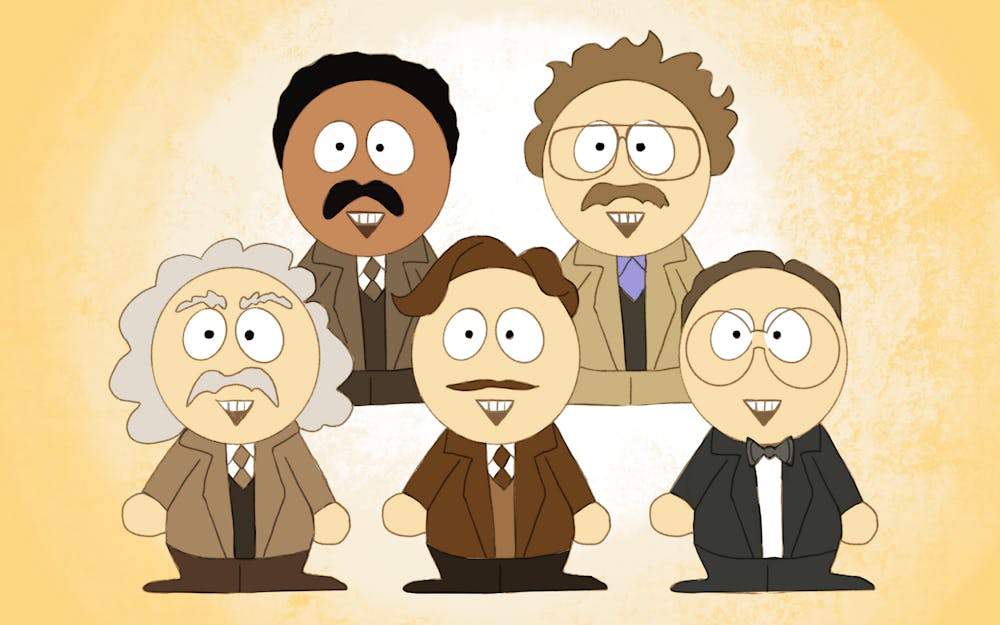For all its massive popularity, I’ve never been a fan of “South Park.” This is, in part, because of its mean-spirited sense of humor, something I don’t see a whole lot of value in — if the whole point of the series is to be as mean as possible to as many groups of people as possible, then what’s the point?
It’s also because of its extreme failure at being a thoughtful satire of current society. It is a satire, that much is true. As vulgar as its humor is, at its core, “South Park” is a continuation of the traditional lampoon style of comedy. But its whole “we make fun of everyone equally” schtick is more an indication of its creators’ libertarian beliefs than it is any intriguing critique of the world around us.
“South Park” is also a case study in satire gone wrong for another reason — i.e., the inability of its fanbase to understand the fact it’s satire. I don’t have any statistics to back up this claim, but I’d be willing to bet most viewers watch “South Park” for its aforementioned mean-spiritedness than they do to understand social issues from another perspective. Every single bit of Cartman merchandise only proves my point. Never mind the original intentions of Trey Parker and Matt Stone: they’ve created a nihilistic beast that encourages political and social apathy. Why not comedically punch down? It’s not like anything matters anyway.
And this is a broader issue relating to satire more generally –– “South Park” is just the foremost example of it. There exists a very fine line between good and bad satire, and a major component of that is the audience reaction to it. Theoretically, satire should be clear enough that those the satire is making fun of shouldn’t be able to misconstrue it to the point of assuming it’s supportive. And that’s originally how I wanted to frame this critique: the fact that, like “South Park,” positive reaction toward satire from those being satirized indicates a broader failure of the satire itself. And, while I do believe this to be the case with “South Park,” I’ve realized the fine line is also a blurry one.
One of my favorite sitcoms of all time, “It’s Always Sunny in Philadelphia,” suffers from the same issue, but I don’t feel the same way about it. Maybe this is a sign of hypocrisy on my end, a bias that says, “this program I don’t like is bad, but this one I do is okay.” But, more than audience reaction, I do think it comes down to the message the creators are trying to convey.
[Related: OPINION: Happiness is a world without capitalism]
I’d be one of the first to argue that “Always Sunny” is one of the most left-wing programs on television, though it masks its politics with a veneer of dark irony. It’s a show that’s at odds with itself, at once deliberately problematic yet still conscious of the day-to-day issues of the working class. And, unlike the vulgar nihilism of “South Park,” it’s also a show that’s willing to tackle social issues with grace. This is perhaps achieved most beautifully in the episode, “Mac Finds His Pride,” in which the titular character comes out to his father in a ballet scene set to “Varúð” by Sigur Rós.
But, to return to my original point, how is the gracefulness with which it approaches complex issues reconcilable with the fact a good portion of the audience is ignorant of the fact its dark humor is satire? The same audience that, now the show has gotten decidedly more obviously progressive, decries it as being “too political” — a criticism the cast has vehemently argued against.
So, the debate becomes less about satire as a genre and more about the ethics of using dark humor to make a broader point. I’m of the belief that it may be used to great effect, as in shows like “Always Sunny” or “BoJack Horseman” or “Atlanta.” Maybe, then, the act of those being satirized not understanding the joke is an irreconcilable inevitability. Not that anyone wants this to be the case. I’m certain nobody who worked on the show wants people to find BoJack so funny as to consider him relatable. But, hey, what are you gonna do about it?
Well, it’s not such a bad thing to start at the root of the problem: in 2022, Media Literacy Now conducted a survey that found only 38% of U.S. adults reported learning in high school how media affects their feelings, actions and beliefs. This is absolutely applicable to satire — the knowledge of how to differentiate between sincerity and sarcasm, and how to critically think beyond the surface-level, is integral to the study of this genre. It’s disheartening to know then that, according to the Open Society Institute’s 2023 Media Literacy Index, the U.S. ranks 17th among developed nations in overall media literacy.
It's true this won’t fix the fact some people will always find outrageously bigoted humor funny, but it can improve the problem of those people finding a supposed refuge in the things making fun of them. It won’t fix “South Park” per se — I’m convinced the only way to achieve that feat is to cancel it entirely — but it could fix TV’s better satires. Conservatives won’t feel so emboldened by “Always Sunny” if they understand the show abhors their regressive beliefs.
[Related: OPINION: Sincerity in the age of irony]
The lack of quality media education in an increasingly media-saturated world is a vital systemic problem we must tackle. It’s an issue that goes beyond recognizing satire — for example, how can we, in the Media School, create anything if our audience hasn’t the skills needed to really understand it?
Joey Sills (he/him) is a junior studying English and political science.






